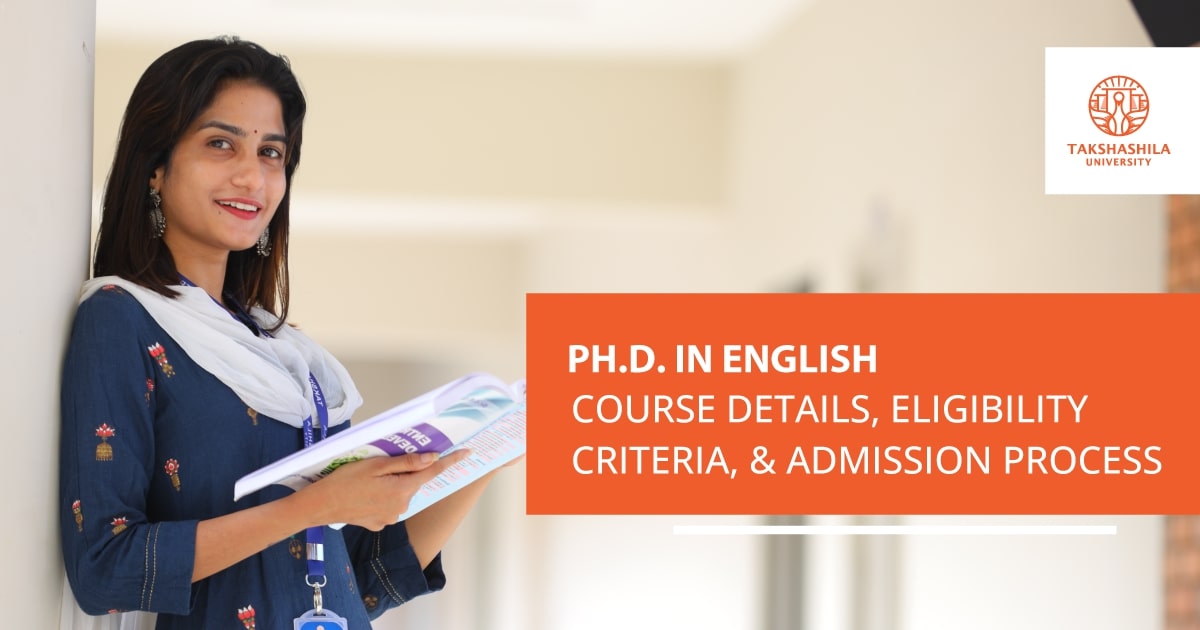Everyone knows English is the language of global business, science, and communication. Choosing a Ph.D. in English is a challenging task. It includes more concepts like syntax, semantics, pragmatics, morphology, phonetics, and phonology and a clear understanding of grammar, sentence tone, clarity, and more. It allows you to work deeply with literature, linguistics, and cultural studies.
English as a domain has grown beyond the study of classical literature to include linguistics, media, and creative and cultural studies. In these courses, English is an integral part of our daily lives, and its significance extends beyond just being a means of communication or drafting sentences. It has become a tool for expression, creativity, and intellectual discourse.
This blog provides potential students with a thorough overview of what to expect from the PhD in English programme, including its structure, course details, eligibility criteria, admission process, benefits, job roles, and the latest research topics.
Course Details
The Ph.D. in English at Takshashila University features a complete curriculum that combines coursework, research, and creative experience. This structure guarantees the development of analytical, critical, and research skills vital for academic and professional success.
Core Curriculum
- Literary Theory and Criticism: Students deal with major theoretical frameworks that have shaped literary analysis, including structuralism, post-structuralism, feminism, and post-colonialism.
- Historical Views of Literature: This course looks at the evolution of English literature through various historical periods, such as the Renaissance, Enlightenment, and Modernism.
- Research Methodologies: A crucial part of the curriculum, this course delivers students with qualitative and quantitative research methods, providing them with tools to conduct their self-reliant research effectively.
- Specialised Electives: Students can choose electives based on their interests, which may include:
- Creative Writing
- Comparative Literature
- Digital Humanities
- Linguistics
- Author
- Dissertation Research: The core of the Ph.D. in English programme involves original dissertation work. Students will conduct intense research on a chosen topic and contribute new details to the field.
- Seminars and Workshops: Throughout the program, students are boosted to participate in seminars and workshops where they can present their department to submit research papers/ articles, engage with professionals in the field, and study new age trends in English studies.
Eligibility Criteria
Regarding the criteria section, Pursuing a Ph.D. in English at Takshashila University must meet specific eligibility criteria. Understanding these requirements is crucial for future students:
- Educational Qualifications:
Applicants should have a Master’s degree in english, literature, or a related field, with a minimum percentage,or CGPA as the university’s guidelines decide.
- Entrance Examination:
Candidates must successfully pass an entrance examination designed to assess their knowledge of English literature, language, and relevant critical theories.
- Research Proposal:
A significant application element is the submission of a detailed research proposal. This proposal should outline the intended area of study, objectives, and methodology and verify the candidate’s research skills and interests.
- Interview Process:
Once shortlisted, candidates may be invited for an interview with faculty members of the English department. This interview allows candidates to discuss research topics and evaluate their skill set with the programme.
Admission Process
The admission process for the Ph.D. in English at Takshashila University is systematically designed to identify candidates with the appropriate academic background and research potential skills.
Here’s a step-by-step guide to the admission process:
Application Submission:
Interested candidates must complete the online application form on the Takshashila University website and upload the required documents, including academic details and research topics.
- Entrance Exam Registration:
Candidates must register for the university’s entrance examination within the specified timeline.
- Preparing for the Entrance Exam:
Successful candidates should prepare by reviewing major literary texts, theories, and research methodologies relevant to English studies.
- Interview phase:
Once the candidates clear the entrance examination, they will be invited for an interview to discuss their understanding and interest in their chosen research area further.
- Final Selection:
After interviews, successful candidates will receive notifications about their admission status. Those accepted must complete the enrolment process, including the payment of fees and registration.
- Commencement of Studies:
Once enrolled, students will begin their studies in the field of coursework and research activities as part of their PhD journey.
What is the Benefit of a Ph.D. in English Course?
Pursuing a Ph.D. in English offers various benefits that extend beyond academic credentials:
- Expert Knowledge: The program provides a deep understanding of literary studies, linguistic theories, and critical methodologies, helping graduates to become field experts.
- Career Opportunities: PhD graduates have strong analytical and communication skills, making them highly valuable in various sectors, including education, publishing, journalism consultancy, associates and content creation.
- Research Contribution: PhD candidates have the opportunity to contribute original ideas and findings to the field of English, thus helping to boost knowledge within their area of expertise.
- Networking: Students have the chance to connect with leading scholars, educators, authors,editors, and professionals through seminars and workshops, promoting valuable professional relationships.
- Enhanced Critical Thinking: The steady nature of the programme produces advanced critical thinking abilities applicable to various professional roles.
Job Roles for PhD in English Course Graduates
The job market for Ph.D. in English graduates is both various and rewarding. Below are some common career paths:
- University Professor: Teaching and conducting research in English literature, linguistics, or writing at higher education institutions.
- Research Scholar: Working on research projects within educational, publications or governmental institutions, contributing to literary and linguistic studies.
- Editor: Working with publishers or literary magazines to evaluate, edit, and validate written content.
- Content Creator: Writing and creating content for various media platforms, including blogs, articles, Newsletters, IT and educational materials.
- Linguist: Conducting research on language structure, usage, and evolution, often working in educational or governmental publications settings.
- Cultural Analyst: Analysing cultural theories through the lens of literature and language, often in media or consultancy roles.
Recent Demand Research Topics for Ph.D. in English Course
As the study of English continues to grow, several modern research areas are developing as key interests for scholars. Some of the recent demand research topics for a Ph.D. in English include:
- Digital Humanities: Studying the intersection of technology and literature, focusing on the impact of digital tools on literary studies.
- Eco-Criticism: Working on literature’s representations of nature and environmental concerns, analysing how texts respond to ecological issues.
- Postcolonial Studies: Analysing literary works produced in postcolonial contexts, focusing on themes of identity, culture, and power dynamics.
- Gender and Queer Studies: Focusing on how gender and sexual identities are represented and constructed in literature and culture.
- Narrative Theory: Develop and draft storytelling techniques across different genres and cultures, dealing with how narratives shape human experience.
Ph.D. in English Course Salary in India
The salary range for Ph.D. in English graduates in India can vary based on job role, experience, and location. Here’s a general overview of salary expectations
| Job Role | Salary Range (per annum) |
| University Professor | ₹6 LPA to ₹15 LPA |
| Research Scholar | ₹5 LPA to ₹12 LPA |
| Editor | ₹4 LPA to ₹10 LPA |
| Content Creator | ₹3 LPA to ₹8 LPA |
| Linguist | ₹5 LPA to ₹10 LPA |
| Cultural Analyst | ₹6 LPA to ₹12 LPA |
Where Literary Dreams Meet Academic Excellence: Takshashila University
At Takshashila University, we are committed to nurturing intellectual leaders in English. We proudly collaborate with world-class institutions like Cambridge and other reputable universities to provide a significant concept environment for our scholars. Our dedication to integrating top methodologies with standard research methods sets us apart.
We developed our students with more than academic toppers by offering specialised workshops in digital storytelling, linguistics software, and cross-cultural analyses. From creative writing and media studies to critical theory and linguistics, our programs prepare scholars with the tools to excel in this field, publishing, and more.
Course Offerings
Takshashila University offers extensive programs across disciplines, including Engineering and Technology, Arts and Science, Humanities, Law, and Business. Our English PhD program is one of the flagship courses that combine classical knowledge with modern analytical frameworks.
Conclusion
This blog has detailed everything upcoming scholars need to know about a PhD in English, from course details to future opportunities. This program is not about a milestone in literature and culture; it is a new journey format that allows individuals to create their topics in literature, media, and cultural studies.
Takshashila University promotes a positive environment where research excellence meets modern application. Scholars graduating from our program are not only prepared to create a new era of education but are also given the best to leave a significant impact on global literature around language, culture, domain and society.
FAQ – Phd in English
1. How long does it take to complete a Ph.D. in English?
Typically, a Ph.D. in English takes around 3 to 5 years to complete, depending on the student’s research progress and the specific requirements of the programme.
2. Can I pursue a Ph.D. in English part-time?
Yes, many universities, including Takshashila University, offer part-time Ph.D. options for working professionals.
3. Are scholarships available for Ph.D. students?
Yes, various funding options such as scholarships, teaching supports, or research plans may be available for Ph.D. students.
4. What career options do I have after completing a Ph.D. in English?
Career options include teaching positions, research roles in education or public sectors, editing, content creation, software technical writer and positions in cultural organisations.
5. What skills do I need to succeed in a Ph.D. programme?
Successful Ph.D. candidates typically develop strong analytical skills, excellent writing abilities, communication, critical thinking, and a strong passion for their chosen field of study.






